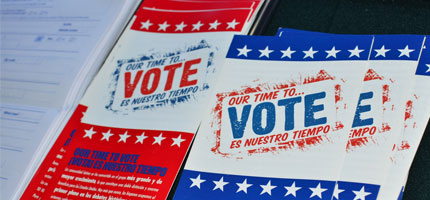
Hispanic Federation v. Byrd
What's at Stake
Of all 50 states, Florida ranks 47th in percentage of its eligible citizens who are registered to vote. Yet, in May 2023, Florida Governor Ron DeSantis signed SB 7050, which bars any noncitizen — regardless of lawful residence status — from working or volunteering for third-party voter registration organizations (3PVROs) who register eligible Floridians to vote. In practice, the law imposes a $50,000 fine on a 3PVRO for each noncitizen who engages in voter-registration work on a 3PVRO’s behalf. This law would silence and put out of business countless community-based groups that rely on both citizens and noncitizens to help eligible voters in their communities participate in their democracy.
Summary
Immediately after SB 7050 passed, ACLU, the ACLU of Florida, Demos, LatinoJustice PRLDEF, and Arnold & Porter Kaye Scholer LLP filed suit in federal court to block the law on behalf of plaintiffs Hispanic Federation, Poder Latinx, and three individual non-citizens who register voters for Florida 3PVROs.
The lawsuit argues that SB 7050’s non-citizen ban restricts plaintiffs’ First Amendment right to free speech, by preventing them from communicating their belief that every eligible voter should participate in shaping their government. It argues that SB 7050 would harm Hispanic Federation and Poder Latinx because it would effectively halt their operations by decimating their voter-registration workforce. In addition, the suit charges that SB 7050 violates the First Amendment because it is unlawfully broad, as well as the Due Process Clause because it is too vague. It also alleges that SB 7050 impedes plaintiffs’ right to contract for discriminatory reasons. And lastly, the suit argues that SB 7050 enacts an unconstitutional alienage-based restriction in violation of the Equal Protection Clause.
In July 2023, the federal court agreed with plaintiffs’ equal-protection claim and preliminarily enjoined SB 7050’s non-citizen ban provision before it took effect. Doing so, Chief Judge Mark Walker explained that the law would prevent the plaintiffs from “embody[ing] those democratic ideals that, for nearly two hundred forty-seven years, have made our system the envy of the world.”
The state appealed the trial court’s decision, and the Eleventh Circuit Court of Appeals heard argument on the emergency injunction in January 2024. A full trial on the merits was held in April 2024.
UPDATE: On May 15, 2024, Chief Judge Mark Walker entered final judgment for the Hispanic Federation Plaintiffs, finding that the Citizenship Requirement is facially unconstitutional because it violates non-citizens' right to equal protection under law.
Legal Documents
-
12/04/2023
Defendants-Appellants' Reply Brief re Preliminary Injunctoin -
11/13/2023
Appellees Brief Supporting Preliminary Injunction -
08/21/2023
Defendants-Appellants' Br. re Preliminary Injunction
Date Filed: 12/04/2023
Court: Appeals Court (11th Cir.)
Affiliate: Florida
Download DocumentDate Filed: 11/13/2023
Court: Appeals Court (11th Cir.)
Affiliate: Florida
Download DocumentDate Filed: 08/21/2023
Court: Appeals Court (11th Cir.)
Affiliate: Florida
Download Document-
05/15/2024
Order on Merits -
05/03/2024
Hispanic Federation Plaintiffs' Rebuttal Closing Argument -
04/29/2024
Secretary of State's Written Closing Argument -
04/22/2024
Hispanic Federation Plaintiffs' Closing Argument -
03/27/2024
Hispanic Federation Plaintiffs' Written Opening Statement -
03/27/2024
Secretary of State's Written Opening Statement -
03/01/2024
Order Granting Summary Judgment -
01/23/2024
Plaintiffs' Memorandum in Support of Summary Judgment -
07/03/2023
Order Granting Preliminary Injunction -
06/08/2023
Motion for Preliminary Injunction -
05/25/2023
Complaint
Date Filed: 05/15/2024
Court: District Court (N.D. Fla.)
Affiliate: Florida
Download DocumentDate Filed: 05/03/2024
Court: District Court (N.D. Fla.)
Affiliate: Florida
Download DocumentDate Filed: 04/29/2024
Court: District Court (N.D. Fla.)
Affiliate: Florida
Download DocumentDate Filed: 04/22/2024
Court: District Court (N.D. Fla.)
Affiliate: Florida
Download DocumentDate Filed: 03/27/2024
Court: District Court (N.D. Fla.)
Affiliate: Florida
Download DocumentDate Filed: 03/27/2024
Court: District Court (N.D. Fla.)
Affiliate: Florida
Download DocumentDate Filed: 03/01/2024
Court: District Court (N.D. Fla.)
Affiliate: Florida
Download DocumentDate Filed: 01/23/2024
Court: District Court (N.D. Fla.)
Affiliate: Florida
Download DocumentDate Filed: 07/03/2023
Court: District Court (N.D. Fla.)
Affiliate: Florida
Download DocumentDate Filed: 06/08/2023
Court: District Court (N.D. Fla.)
Affiliate: Florida
Download DocumentDate Filed: 05/25/2023
Court: District Court (N.D. Fla.)
Affiliate: Florida
Download DocumentPress Releases
Federal Court Permanently Blocks Provision of Florida Law that Targeted Voter Registration and Civic Engagement by Community Organizations
Federal Trial Challenging Florida Law that Targets Voter Registration, Civic Engagement, and Political Speech Begins
Victory in Challenge Against Florida’s Anti-Voter Law
Federal Court Blocks Florida Law that Targets Voter Registration, Civic Engagement, and Political Speech
Voting and Immigrants’ Rights Advocates Sue Over New Florida Law That Targets Voter Registration, Civic Engagement, and Political Speech